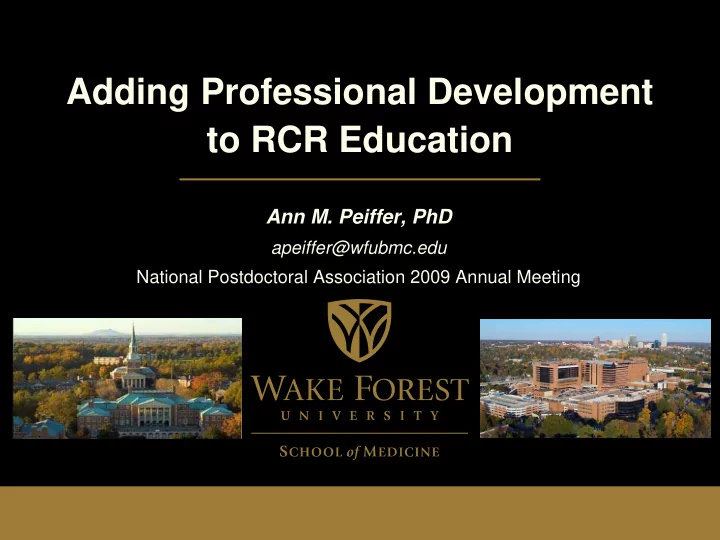

Adding Professional Development to RCR Education Ann M. Peiffer, PhD apeiffer@wfubmc.edu National Postdoctoral Association 2009 Annual Meeting
The Adding Agenda � Teaching experience to RCR education � RCR to the laboratory environment No conflict of interest to report. Supported by NIH NS544722, WFU Office of Postdoctoral Affairs, and NPA Travel Award. Projects supported by NSF 0530028 (Drs. NL Jones and JC Eldridge; WFUSM), NPA “Bring RCR Home” project, and the WFU Graduate School, PA and OPA. Drs. Jones and Eldridge, the ACEP and PDAC groups are recognized for their support.
The Situation � Post-doctoral fellows need RCR and ethics training � No RCR training on campus � Can not sign up for the graduate student course as students � Few teaching opportunities, no training on pedagogy (how to teach)
The First Solution � Appeal to post-docs to facilitate scientific integrity course for graduate students � Offer: � Training and Practice in Problem-Based Learning (PBL) Pedagogy � Training in RCR and Scientific Integrity � Facilitate for 1 year paired with a faculty member in the PBL curriculum
The First Solution � Appeal to post-docs to facilitate scientific integrity course for graduate students � Benefits: � Certificate of completions for training � RCR requirement met � Small group discussion skills � Teaching recognition by the Graduate School Dean (certificate at end of year)
The First Training Program � 16-20 hours prior to beginning course � Presentations � PBL, RCR, Moral reasoning techniques � Practice Facilitating Cases � Extra Resource Materials � Participation: � Year 1 = 16; Year 2 = 9 � Serving less than 10% of the community
The Second Solution: Bring RCR Home � 1st Annual Postdoctoral Development Workshop � Monday, April 27th from 12-5pm � Agenda: � Lunch (provided by WFU Office of Postdoctoral Affairs) � Presentations (during lunch) � PBL, RCR, Moral reasoning techniques � Small group discussion of PBL cases � Written by 4 postdocs during Dec. writing workshop � Topics focus on postdoc issues � Details at my poster this afternoon � Social hour (promote networking)
The Second Solution: Bring RCR Home � 1st Annual Postdoctoral Development Workshop � Benefits: � Certificate of completion � Program description available for grant applications as evidence of RCR training � Postdocs fast-tracked to participate in “The First Solution”
Adding RCR to the Laboratory � 15 minute discussions added to weekly journal club � ~10-11 hours training per year � All laboratory members participate and pick articles � Faculty, postdocs, students, and staff � Rated highest compared to other education styles � Effectiveness (4.1/5) � Enjoyment (4.6/5) jburg.typepad.com/future/scams/index.html 8/9/2007
Adding RCR to the Laboratory � Topics vary based on interest � Discussion of best practices for research study � Impact of economy on grants, research and publishing � FFP cases and concerns � Conflict of Interest, right to privacy, informed consent � Peer review: grants, manuscripts, science news, blogs � Implications of drug advertising � International research and collaboration � Sources: News articles or ethic stories in Science , Nature , NY Times , ORI Reports
Reactions to 15 Min RCR Discussions � Support development as a researcher with integrity � Changes the laboratory environment � Consider the ethical implication of other research � More confident in discussing ethical situations in research � Identify potential ethical conflicts in personal research � Trainees and staff agree that they freely can report protocol violations and mistakes to their superior � “[sic] Great approach for keeping good clinical practices in the front - not the back- of your mind.”
Final Thoughts � Seize opportunities as they come no matter how small they appear � You do not need to reinvent the wheel � Deans and PI’s will notice � Empower each individual � Cultivate diversity in the volunteer pool � Find a way to get buy-in from PI’s and program directors that extend beyond compliance � Communicate efficiently but prolifically � Conversations on RCR topics enrich and change the environment - get people talking!
Recommend
More recommend